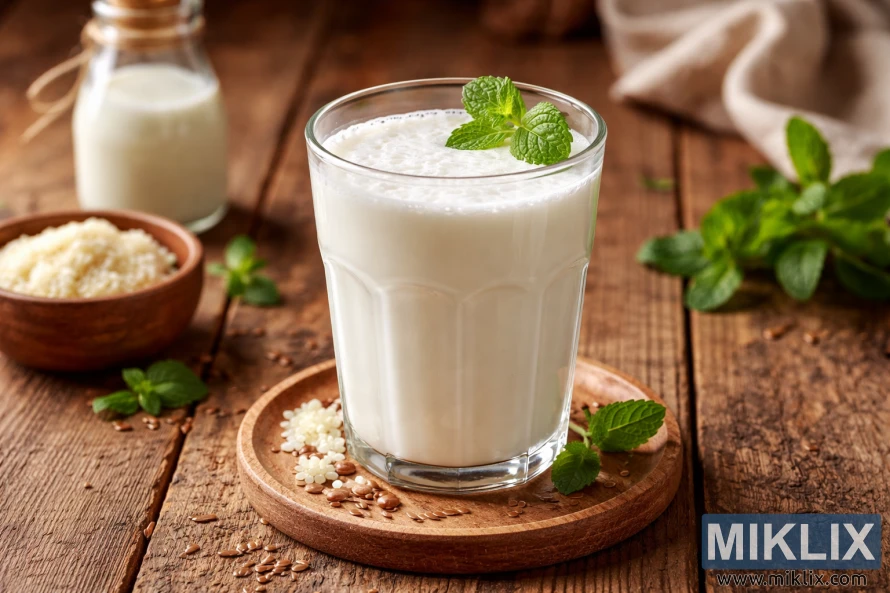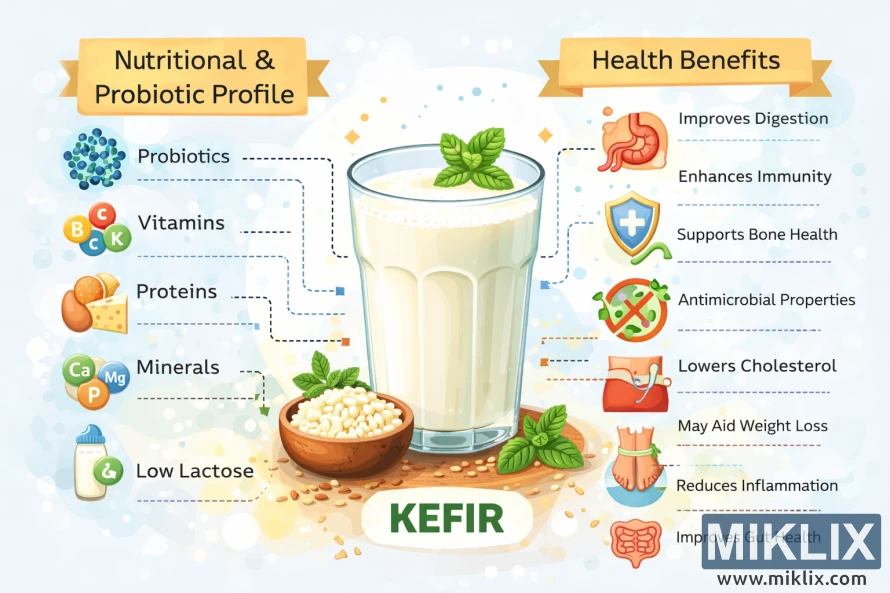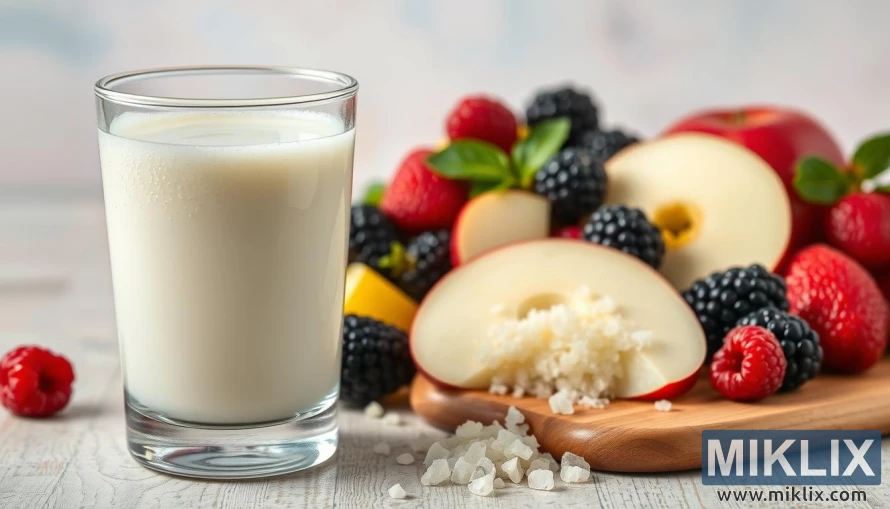Sippable Wellness: The Surprising Benefits of Drinking Kefir
Published: May 15, 2025 at 11:54:26 AM UTC
Last updated: December 25, 2025 at 11:45:00 AM UTC
Kefir is a tasty fermented milk drink full of health perks. It's known for its probiotics, which are great for your gut. Drinking kefir can help improve digestion and boost your overall health. But kefir's benefits don't stop there. Studies show it can also strengthen your immune system. It might even help fight cancer. Let's dive into the amazing health benefits of kefir and how it can boost your daily diet.

Key Takeaways
- Kefir is rich in probiotics, promoting gut health.
- The benefits of drinking kefir include enhanced immune support.
- Kefir may aid in bone health and osteoporosis prevention.
- Regular consumption of kefir has potent cancer-fighting properties.
- This fermented drink can help manage lactose intolerance.
What is Kefir?
Kefir is a special fermented milk drink from the Caucasus Mountains in Eastern Europe. It's made by adding kefir grains to milk from cows, goats, or sheep. This creates a tangy, fizzy drink that's different from regular yogurt.
There's also a water-based version called water kefir. It's made with sugar water and kefir grains, perfect for those who prefer non-dairy options.
History and Origin of Kefir
The word "kefir" comes from the Turkish language, meaning "good feeling." This drink has a long history, loved for its taste and health benefits. It originated in the Caucasus region, where it was cherished for centuries.
Different cultures have valued kefir for its health benefits. In the Caucasus Mountains, nomads carried kefir grains in leather pouches. This method created a tangy, probiotic drink that's now popular worldwide.
Kefir holds a special place in many cultures. It's part of traditional diets and rituals, known for its nutritional value. Today, it's available globally, attracting those looking for a healthy drink option.
Kefir's Nutritional Profile
Kefir is packed with nutrients, making it a superfood. A cup of low-fat kefir has about 104 calories. It also has 9 grams of protein, 11.6 grams of carbs, and 2-3 grams of fat. These numbers show kefir is a great choice for those who care about their health.
Kefir is also full of important vitamins and minerals. Here are some key ones:
- Calcium: 36% of the daily value
- Phosphorus: 20% of the daily value
- Vitamin B12: 29% of the daily value
- Riboflavin: 25% of the daily value
Kefir has more than just basic nutrients. It has bioactive compounds that boost health. You can make kefir from dairy or non-dairy like coconut water. This means you can pick the one that suits your diet best.

The Probiotic Power of Kefir
Kefir is packed with kefir probiotics, featuring up to 61 strains of beneficial bacteria and yeasts. It's a real powerhouse for gut health. These microorganisms, like Lactobacillus and Streptococcus, help improve digestion and gut health.
Kefir's probiotics do more than just aid digestion. They help keep the gut microbiome balanced, which can ease symptoms of irritable bowel syndrome and diarrhea. Drinking kefir regularly boosts digestive health and strengthens the immune system. It's a better choice than traditional yogurt.
Adding kefir to your diet unlocks many health benefits, thanks to its high probiotic content. As more people learn about gut health, kefir's popularity grows. It's becoming a key part of promoting overall wellness.
Kefir vs. Yogurt: Which is More Beneficial?
When we look at the health benefits of yogurt and kefir, a key difference stands out. Kefir often beats yogurt in terms of variety and nutrition. Yogurt mainly has bacteria, which is good for your gut.
Kefir, though, has both bacteria and yeast. This makes it richer in probiotics. It also has less sugar and calories, which is great for those watching their diet.
The texture of kefir is another plus. It's thinner, making it easy to mix into smoothies, dressings, and baked goods. This makes kefir a versatile choice for improving your diet.
Digestive Health Benefits of Kefir
Kefir is known for boosting digestive health. It has probiotics that help keep the gut balanced. This balance is key for good gut health.
Drinking kefir regularly can bring big kefir digestive benefits. It helps those with stomach problems feel better. It can even help with diarrhea and ulcers, thanks to its probiotics.
Kefir also helps your body absorb nutrients better. This means your digestive system works better. Its mix of good bacteria and yeasts keeps your gut healthy and working right.

Kefir's Antibacterial Properties
Kefir is known for its probiotics and antibacterial effects. It contains probiotics like Lactobacillus kefiri that fight harmful bacteria. These include Salmonella, E. coli, and Helicobacter pylori.
Studies show kefir's unique mix stops these bad bacteria from growing. This helps keep your digestive system healthy and prevents infections. Kefiran, a natural sugar in kefir, also helps fight off microbes.
Adding kefir to your meals boosts your probiotics and fights off bad bacteria. Drinking it often can protect you from infections. Its antibacterial powers are a big plus.
Bone Health: Kefir and Osteoporosis
Kefir is great for your bones, helping prevent osteoporosis. It's full of calcium, which is key for strong bones. Plus, it has vitamin K2, which helps your body use calcium better, making bones even stronger.
Studies show that drinking kefir can help your body absorb more calcium. Animal tests found that kefir drinkers have denser bones. This makes kefir a good choice for keeping bones healthy, mainly for older people.
Adding kefir to your meals can boost your calcium and vitamin K2 intake. This is good for your bones. For those worried about bone health, kefir is a tasty way to stay healthy.
Kefir and Its Cancer-Fighting Properties
Studies are showing that kefir might help fight cancer. The probiotics in kefir could boost the immune system. This could help reduce tumor growth.
Lab tests found that kefir extract cuts human breast cancer cells by 56%. This is more than yogurt extract. These results show kefir might have big benefits against cancer.
Scientists are now looking into how kefir works against cancer. The early results are exciting. But, more studies on people are needed to confirm these findings.
Adding kefir to a healthy diet could help prevent cancer. It might work well with other treatments to improve health.

Kefir's Effect on Immune System Function
Drinking kefir regularly can boost your immune system in many ways. It's full of probiotics, which are key for a strong immune system. The different microbes in kefir help keep your gut healthy, acting as a shield against harmful germs.
Studies show that kefir's probiotics can also control inflammation in the body. This can help reduce allergy and asthma symptoms, leading to better health. Plus, these probiotics can work well with immune cells, making your body's defenses stronger.
Even though some research and stories suggest kefir's benefits, more studies are needed to confirm its effects. Adding kefir to your diet could be a tasty way to support your immune system.
Managing Lactose Intolerance with Kefir
Kefir is a great choice for those with kefir lactose intolerance. It has live cultures that help digest lactose. The fermentation process breaks down lactose into lactic acid, making it easier to digest than regular milk.
Research shows that drinking kefir regularly can improve lactose digestion. The good bacteria in kefir help break down lactose further. This means many people can enjoy kefir without feeling uncomfortable. Here are some reasons why kefir is good for those with lactose intolerance:
- Lower lactose content than traditional milk.
- Presence of probiotics that aids in lactose digestion.
- Versatile and can be used in various recipes, making it easy to incorporate into daily meals.
Adding kefir to your diet can be a tasty and effective way to manage lactose intolerance. Try kefir and see how it can improve your lactose digestion and overall health!
Kefir's Impact on Heart Health
Kefir is a strong ally for heart health. Its special probiotic mix may offer great benefits for the heart. Drinking kefir regularly can help control blood pressure, making it great for heart-healthy diets.
Studies show kefir can lower cholesterol levels. This is good news for those wanting to boost their heart health. It also helps keep triglyceride levels in check, which fights heart disease.
Research suggests kefir can reduce the risk of metabolic syndrome. This condition includes high blood pressure and high cholesterol, raising heart disease risk. Adding kefir to your diet may improve your heart health.
Easy Ways to Incorporate Kefir into Your Diet
Adding kefir to your meals is easy and tasty. There are many ways to enjoy this healthy drink. Here are some ideas to get you started:
- Add kefir to smoothies for a creamy texture and probiotic boost.
- Use kefir in salad dressings as a tangy alternative to mayonnaise.
- Enjoy kefir plain as a refreshing drink or with breakfast.
- Mix kefir with fruits and grains for a nutritious morning meal.
- Make savory dishes using kefir as a base for sauces and marinades.
If you want to make your own kefir, you can buy kefir grains online or at health food stores. Making kefir at home is simpler than you think. With a bit of patience and practice, you can make fresh kefir every day. You can also try different kefir recipes to find your favorite.

Conclusion
Kefir is a superfood packed with probiotics and nutrients. It offers many health benefits, like better digestion and a stronger immune system. Its long history shows it's been loved for generations, proving its value in many diets.
Adding kefir to your daily routine can bring many health perks. It might even help protect against diseases and boost bone health. This tasty drink is not only delicious but also great for your overall health, making it a smart choice for your diet.
So, let's make kefir a regular part of our lives. Its unique taste and high nutritional value mean it's more than just a treat. It's a way to improve your health and well-being, easily and deliciously.
Further Reading
If you enjoyed this post, you may also like these suggestions:
- Low-Carb Hero: The Surprising Benefits of Cauliflower
- From Bean to Benefit: The Healthy Side of Coffee
- Enjoying Almonds: The Small Seed with Big Benefits
